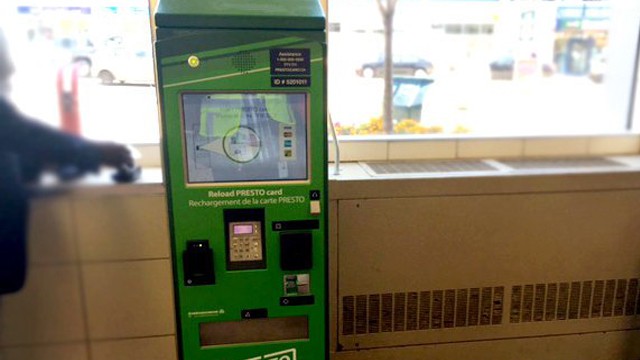Mississauga Set to Pay More for PRESTO
Published April 21, 2017 at 3:07 am

The best things in life aren’t free after all (but you already knew that).
Recently, city staff presented General Committee with a recommendation to approve Mississauga’s PRESTO agreement in principle with Metrolinx.
Well, what does that mean, exactly?
Basically, the agreement means that Mississauga–along with a host of other 905 municipalities–will pay a fixed percentage on the revenues generated from the use of PRESTO cards. Under the agreement in principle, the city will pay nine per cent of revenues rather than the two it’s paying now.
According to the staff report, Metrolinx will be responsible for all aspects of fare collection through PRESTO as part of the agreement. Mississauga will be required to make a capital investment on new equipment and potentially make contributions to finance the development of new PRESTO features.
In terms of numbers, the city’s fare collection costs are expected to increase from the $736,000 it paid in 2016 to $6,187,000 in 2021.
“…As additional features are added, responsibility for device maintenance transfers to Metrolinx and the amount of revenue collected via PRESTO increases,” explained Janice Baker, City Manager and Chief Administrative Officer, in a statement. “The capital costs have not yet been defined but will focus around three components – device refresh, point of sale devices and capital contributions on new functionality features. We are estimating that for the device refresh the city’s contribution will be in the range of $15 to $20 million. Other costs will be defined by the bidding process.”
While the cost increases are significant, Mississauga Mayor Bonnie Crombie called the agreement an “important step forward,” pointing out that participation ensures the city will benefit from the provincial gas tax program.
“This PRESTO Agreement in Principle is an important step forward as part of our ongoing work to build a transit-oriented city. Having a single fare card system will improve customer service and help residents travel more seamlessly to school, work and across the Greater Toronto Hamilton Area (GTHA),” Crombie said in a statement. “Joining other 905 GTHA municipalities also ensures that we continue to be part of the Provincial Gas Tax Program which provides ongoing and predictable funding toward building, expanding and maintaining our public transit network.”
Baker mentioned that details pertaining to the agreement are still being finalized.
“This agreement in principle sets out the framework for the continued delivery of PRESTO services in Mississauga,” said Baker. “With council’s approval, the next step will be to finalize detailed agreements with Metrolinx and the 905 municipal transit providers to develop the PRESTO Operating Agreement. The goal is to have the operating agreement in place by October of this year. The term of the operating agreement would be from October 2017 to November 2027.”
While the costs do seem high, it is true that PRESTO is convenient for commuters–especially those navigating a changing transit system in a rapidly developing city.
“PRESTO allows customers to simply load a card, tap when boarding and have unlimited travel for two hours on all 905 buses as well as a discounted fare when transferring to a GO service,” said Geoff Marinoff, Transit Director. “This new agreement will provide continued support, new functionality and advance MiWay’s phased approach to PRESTO growth. About 60 per cent of MiWay’s fare revenue is collected via PRESTO and this is expected to grow to 80 per cent through the duration of this agreement.”
The PRESTO agreement in principle will go before Mississauga City Council on April 26 for final approval along with the required by-law authorizing the continued negotiations of the 10-year PRESTO operating agreement.
It is important to note that other municipalities must be on board with the proposed changes.
The PRESTO agreement in principle and the PRESTO operating agreement require the approval of all participating 905 transit agencies, including Hamilton, Burlington, Oakville, Brampton, York Region, Durham Region and Mississauga. Metrolinx must also be in agreement with the plan.
As of now, municipalities are co-responsible for daily operations.
The current agreement came into effect in 2006 with the start of the electronic public transit fare collection system in Ontario. Since this agreement, the Government of Ontario transferred the responsibility to Metrolinx.
insauga's Editorial Standards and Policies advertising





